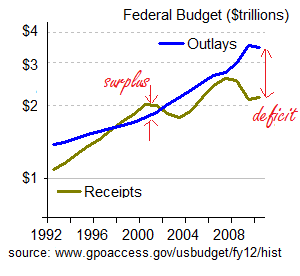TakeAStepBack
Gold Member
- Mar 29, 2011
- 13,935
- 1,742
- 245
So the government should borrow another 800 billion dollars from China to pay people to dig holes and fill them back in? Is this what the left calls sound economic activity?
Yes, it is. When economy is depressed virtue become vice. Everyone tightening their belts will only make things worse.
And this is not such a difficult concept to understand, yet you DO have to possess some brain matter in order to achieve that understanding. The problem with people like you is that you can't think beyond bumper sticker slogans.
And that is the ultimate reason we have this depression.
It will make things worse until people are out of hock. Thats life. If you borrow more money to pay for things that you can not afford (in this case you're suggesting the federal govt. borrow money from China to pay employees) you eventually come right back around to the same problem; lack of actual savings/wealth and an overwhelming debt burden. There are no two ways around this, LOLberal.
You can not spend your way out of debt and into wealth. Only a complete fucking fool believes that.

